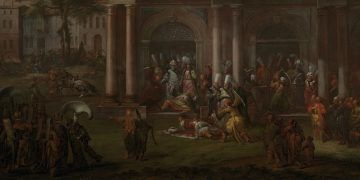Nancy Lemann in Lapham’s Quaterly:
 When I first moved to Washington, I attended a party at Blair House, which stands across Lafayette Square from the White House. Visiting dignitaries are often put up there. A tour was led by the chief of protocol, a fragile southerner obsessed with discretion who kept vowing never to write a book about the scandals he had seen, which he kept referring to in a veiled way. The history of the house was poignant. There was the room where Robert E. Lee was offered by Lincoln the command of the Union army, and where he refused it. There was the room where the chandelier almost fell on the king of Morocco right after he got out of bed. The decor was pretty much that of an old genteel country club that has seen better days. The chief of protocol kept picking up vases and saying, “This is from the Ming dynasty, but feel free to hold it”—and practically throwing it at you. The atmosphere was curiously unpretentious.
When I first moved to Washington, I attended a party at Blair House, which stands across Lafayette Square from the White House. Visiting dignitaries are often put up there. A tour was led by the chief of protocol, a fragile southerner obsessed with discretion who kept vowing never to write a book about the scandals he had seen, which he kept referring to in a veiled way. The history of the house was poignant. There was the room where Robert E. Lee was offered by Lincoln the command of the Union army, and where he refused it. There was the room where the chandelier almost fell on the king of Morocco right after he got out of bed. The decor was pretty much that of an old genteel country club that has seen better days. The chief of protocol kept picking up vases and saying, “This is from the Ming dynasty, but feel free to hold it”—and practically throwing it at you. The atmosphere was curiously unpretentious.
I imagined this must be a vestige of the original character and ideals of the capital. For example, one endearing thing about the father of our country was his propensity for self-effacement. Every time they drew him to a post, he would agonize and ultimately accept but essentially stand up and say, “I just want it on the record that I do not consider myself equal to this task.”
That was his basic position on everything. Showing that even the great have self-doubt. Maybe only the great. His professions of unworthiness continued to the end. In his farewell address to the nation after serving two terms as president he said he hoped that his many forms of incompetence would be consigned to oblivion. It sometimes seems a cliché to commend George Washington, but “intellectual humility” is associated with the capacity to maintain convictions, according to a recent scientific study, and I think it is one quality that must characterize an incorruptible man. If only because such a man is capable of admitting his mistakes. He knows he is fallible, and his self-doubt expands the potential of his mind, allowing him to understand that there are better ways than his, and that they can and must be searched for.
More here.
